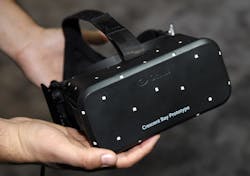Wearable Technology Future is Ripe for Growth, Especially among Millennials
A new report out by PwC's Consumer Intelligence Series found that 20% of American adults already own a wearable device and the adoption rate – on par with tablets in 2012 – is quickly expected to rise.
While fitness bands, smart watches and other wearables are already established in the market, many of them have under-delivered on expectations. Consider that 33% of surveyed consumers who purchased a wearable technology device more than a year ago now say they no longer use the device at all or use it infrequently. Price, privacy, security, and the lack of "actionable" and inconsistent information from such devices are among consumers' main apprehensions with the bourgeoning category.
In fact, 82% of respondents were worried that wearable technology would invade their privacy and 86% expressed concern that wearables would make them more vulnerable to security breaches.
That said, 53% of millennials and 54% of early adopters say they are excited about the future of wearable tech.
Among the top three potential benefits:
1. Improved safety: Ninety percent of consumers expressed that the ability for parents to keep children safe via wearable technology is important.
2. Healthier living: More than 80% of consumers listed eating healthier, exercising smarter and accessing more convenient medical care as important benefits of wearable technology.
3. Simplicity & ease of use: Eighty-three of respondents cited simplification and improved ease of technology as a key benefit of wearable technology.
And for wearables to be most valuable to the consumer, it needs to embrace Internet of Things opportunities; transform big data into super data that not only culls, but also interprets information to deliver insights; and take a human-centered design approach, creating a simplified user experience and an easier means to achieve goals.
"Businesses must evolve their existing mobile-first strategy to now include the wearable revolution and deliver perceived value to the consumer in an experiential manner," said Deborah Bothun, PwC's U.S. advisory entertainment, media & communications leader. "Relevance is the baseline, but then there is a consumer list of requirements to enable interaction with the brand in a mobile and wearable environment."
As part of PwC's The Wearable Future report, consumers were asked to rate how excited they'd be to experience a wearable technology product from a particular brand and, not surprisingly, tech brands have the edge. Wearable technology is at a crossroads, and it's looking down a path on which IT is a driving force, directly impacting the technology industry. Wearable tech products are increasingly being designed with business applications in mind, with the promise of improving workplace productivity and the overall efficiency of organizations.
- Wearables already have a strong incumbent challenger—the smartphone. For wearable products to take off, they will need to carve out a distinct value proposition. And, because the phone is such a fixture, for the short term, at least, wearable technology will need to seamlessly integrate with our existing technology. When asked if they'd need their wearable device to replace an existing piece of technology in order to justify its purchase, 76% of respondents said no.
- Seventy-seven percent of respondents said an important benefit of wearable technology is its potential to make us more efficient and more productive at work. Seventy percent of respondents say they expect their workplace to permit the use of wearable technology, and 46 percent say they think their company should fund the wearable technology, rather than a BYOD (bring your own device) model.
- On the financial back end, payment processing is poised to get a boost from wearable tech. For companies in manufacturing and field service industries, the impact of wearable technology is already underway.
- If wearable technology has the potential to bring higher productivity and a better bottom line, CIOs and IT departments will be the agents to shepherd it through. "Making technology simpler to use" was an important benefit of wearable tech among 83% of respondents and 41% listed "seamless integration with other devices" as a top three reason to adopt wearable technology.
"Inconsistency of data remains one of the top challenges for wearable technologies today. For wearables to be effective across both primary and secondary devices, there needs to be an established frequency of measurement. Enterprises must forge partnerships and develop IT and platform alliances to deliver seamless experiences on both the front end and back end of wearable implementations," said Mike Pegler, principal, PwC US technology practice.
About the Author

Adrienne Selko
Senior Editor - MH&L, IW, & EHS Today
Adrienne Selko has written about many topics over the 17 years she has been with Endeavor Business Media and currently focuses on workforce development strategies. Previously Adrienne was in corporate communications at a medical manufacturing company as well as a large regional bank.
She is the author of Do I Have to Wear Garlic Around My Neck? which made the Cleveland Plain Dealer's best sellers list. She is a senior editor at Material Handling & Logistics, EHS Today, and IndustryWeek.
Editorial Mission Statement:
Manufacturing is the enviable position of creating products, processes, and policies that solve the world’s problems. When the industry stepped up to manufacture what was necessary to combat the pandemic, it revealed its true nature. My goal is to showcase the sector’s ability to address a broad range of workforce issues including technology, training, diversity & inclusion, with a goal of enticing future generations to join this amazing sector.
Why I Find Manufacturing Interesting:
On my first day working for a company that made medical equipment such as MRIs, I toured the plant floor. On every wall was a photo of a person, mostly children. I asked my supervisor why this was the case and he said that the work we do at this company has saved these people’s lives. “We never forget how important our work is and everyone’s contribution to that.” From that moment on I was hooked on manufacturing.
I have talked with many people in this field who have transformed their own career development to assist others. For example, companies are hiring those with disabilities, those previously incarcerated, and other talent pools that have been underutilized. I have talked with leaders who have brought out the best in their workforce, as well as employees doing their best work while doing good for the world.
